We organised a side event at the Food and Agriculture Organization of the United Nations (FAO) in Rome on 18 July highlighting the need to tackle antibiotic resistance through improved animal health and welfare.
The event, called ‘Tackling antimicrobial resistance through improved animal health and husbandry to ensure food security’ brought together government representatives of Pakistan, Uganda, the UK and Tanzania, as well as FAO representatives and our friends at the World Federation of Animals.
Irresponsible use of antibiotics
Worldwide, it is estimated that 73% of antibiotics are given to farmed animals. Diseases can spread quickly in factory farms, due to the poor welfare, and cramped and crowded conditions. To contain this risk, or also for growth promotion, many animals are routinely given antibiotics, even if they are not ill.
This mass use of antibiotics in farmed animals contributes to anti-microbial resistance (AMR) in animals, and people, where live-saving medicine can be rendered ineffective. The World Health Organization lists AMR among the top ten threats for global health and predicts it could lead to around 10 million deaths annually by 2050.
FAO side event explores solutions ahead of High Level Meeting on AMR in September
In May, we contributed to a publication, ‘Call for actionable steps in response to the rising threat of antimicrobial resistance’ to be considered by Member States ahead of the UN General Assembly (UNGA) High-Level Meeting on AMR set for September. At this meeting, held at the UN Headquarters in New York, all 193 UN Member States will adopt a political declaration which sets out the world’s plan to address AMR.
Ahead of this, the event at the FAO provided us with a second opportunity to highlight the need for a multi-sectoral approach to tackling AMR. The session highlighted the connections between animal and human health, showing the impacts of AMR on food security, and analysing ways to effectively address AMR through improved animal health and welfare.
Speakers at the session emphasised the need for consistency and a multi-sectoral, co-ordinated approach between global governance and country–level policy and action, and for an ambitious High Level Meeting declaration to be adopted during UNGA this September.
The moderator of the event was Arjan van Houwelingen, Chief, Strategic Policy and Public Affairs, World Federation for Animals and speakers included Junxia Song, Senior Animal Health Officer, Animal Production and Health Division, FAO and Nelea Motriuc, AMR Multistakeholder Partnership Platform, also at FAO.
Our Global Manager of Food Systems Advocacy, Federica di Leonardo was one of the event’s interveners, as was Chair of the Sub-Committee on Livestock, Ambassador Carlos Cherniak, and Director of the Animal Production and Health Division of FAO, Thiensin Thanawat.
Federica commented: “There is agreement on the fact that if we don’t act with urgency, the global economic impact of AMR will be devastating, but countries with low incomes, and higher infectious disease prevalence, will have more important losses. In other words, if not tackled, AMR will increase inequality.
“There is increasing evidence that promoting animal health and welfare can reduce antimicrobial use and contribute to transforming our food systems. We need bold action to reduce the use of antimicrobials, promoting responsible use, and contributing to a more equitable planet,” she concluded.
